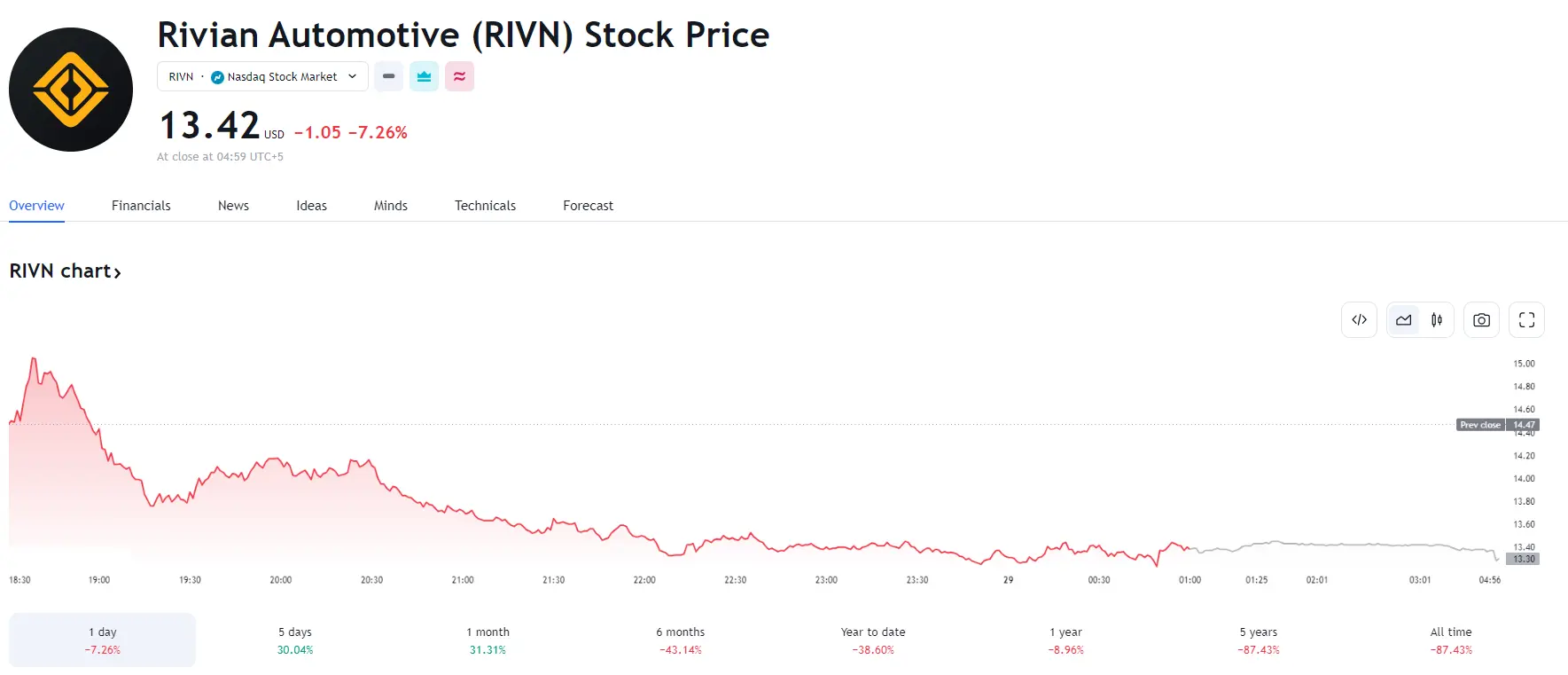Introduction
Rivian Automotive, an American electric vehicle (EV) manufacturer, is an essential player in the financial instruments market. Since its inception in 2009, Rivian has established itself as a leader within the EV market with its ingenuous electric vehicles and SUVs. Rivian went public in November 2021, and since then, the stock has attracted the attention of investors. This article offers a thorough review of the performance of Rivian’s stock as well as critical financial metrics and the market’s trends.
Rivian’s Initial Market Response and its IPO
Rivian was listed on the market on November 10, 2021. The company’s initial public offer (IPO) cost $78 per share. The IPO was among the biggest of its kind in U.S. history, raising more than 12 billion dollars. Rivian’s stock rose on its initial day of trading and closed at $100.73, a sign of the market’s optimism regarding the company’s future.
Current price in 2024

Key Financial Metrics
Earnings and Revenue
Investors and analysts have closely scrutinized Rivian’s financial performance. In the most recent earnings report for the quarter that ended January 2024, Rivian reported revenues of $663 million, which is a substantial increase from the $336 million reported in the first quarter of 2023. However, the company is in the growth phase and has reported losses of $1.59 billion in Q1 2024 compared to the decline of $1.23 billion in the first quarter of 2023.
Production and Delivery
The number of deliveries and production at Rivian are crucial indicators of its potential growth. In the first quarter of 2024, Rivian produced 8,500 vehicles and delivered 7,500, an increase of a large amount from the 5,000 vehicles produced and delivered in the first quarter of 2023. Rivian hopes to manufacture 50,000 vehicles by the end of 2024.
Market Performance
Trends in the Stock Price
Rivian’s price has experienced substantial fluctuations since its IPO. After a record-breaking peak of $179.47 in November 2021, the stock has been through a series of declines. At the time of writing, the Rivian stock was trading at around $45. This is in line with market trends and challenges particular to the EV sector.
Market Capitalization
Despite the fluctuation in the price of its stock, Rivian remains a significant player in the EV market. The company’s market cap is at about $40 billion, which puts it as one of the leading EV makers in the world.
Factors Affecting the Stock of Rivian
Industry Competition
The EV market is highly competitive, with companies such as Tesla, Ford, and General Motors posing significant challenges. Rivian’s capability to distinguish itself by offering distinct product offerings, such as the R1T electric vehicle and the R1S SUV, is vital to its positioning in the market.
Supply Chain Problems
Disruptions to the supply chain have affected various industries, and the EV industry is no exception. Rivian has had difficulties getting essential components such as semiconductors, which has affected its ability to manufacture.
Regulatory Environment
Government regulations and policies play a significant role in the EV market. In addition, supportive measures, like tax incentives for EV purchases and investment in charging infrastructures, could increase Rivian’s chances of growth.
Future Outlook
Expansion Plans
Rivian is working to increase its production capacity. The company is currently building an additional factory in Georgia and anticipates substantially boosting its production capacity by 2025.
Technological Innovations
Rivian’s dedication to innovation is evident through its ongoing investment in research and development. Its advances in battery technology and autonomic driving are anticipated to propel forward growth.
Strategic Partnerships
Rivian has established strategic partnerships with large corporations, including Amazon and Ford. Amazon has a large shareholding within Rivian and has placed orders for the purchase of 100,000 electric delivery vehicles, highlighting Rivian’s capabilities in the commercial EV market.
Conclusion
Rivian’s path through the market has been marked by lows and highs, which reflects the dynamism of the EV sector. While the company faces adversity, however, its impressive growth indicators, strategic initiatives, and innovative product lineup position it for success in the coming years. Investors must keep an eye on the performance of Rivian’s markets and industry trends to better understand the market.